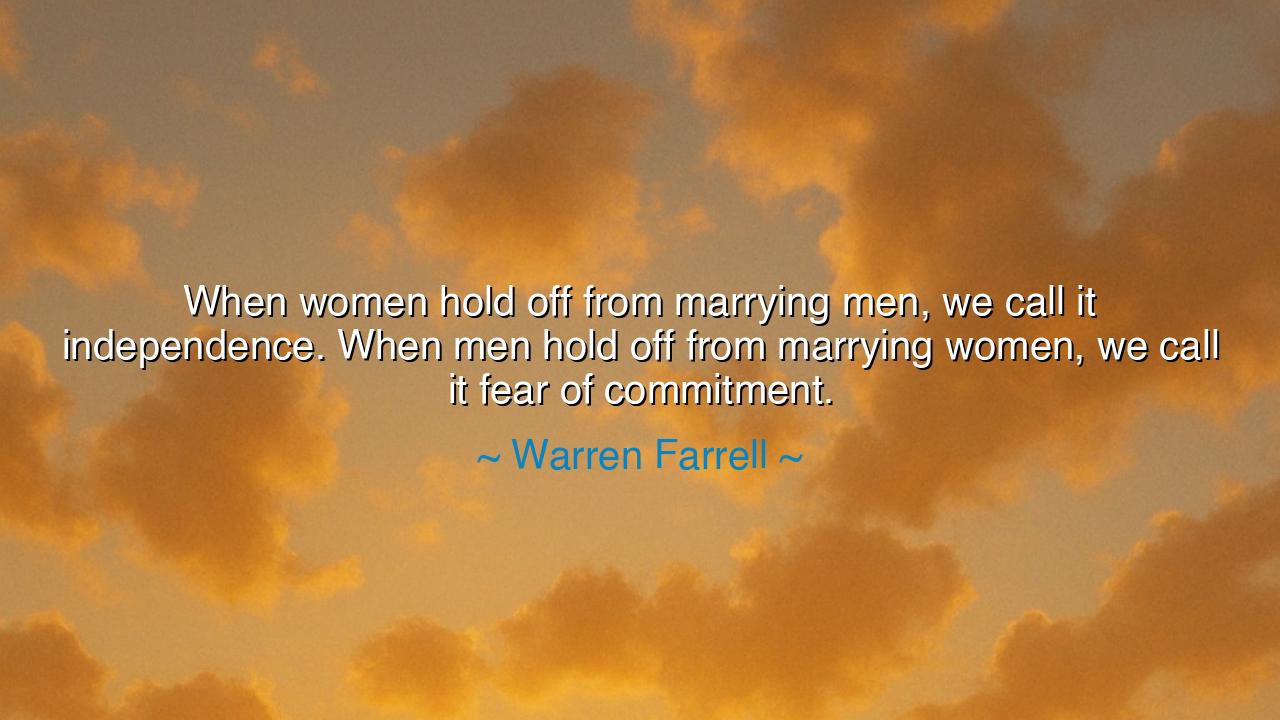
When women hold off from marrying men, we call it independence.
When women hold off from marrying men, we call it independence. When men hold off from marrying women, we call it fear of commitment.






Listen closely, O seekers of truth, for the words of Warren Farrell carry with them the weight of society’s judgments and the deep inequities that define the roles of men and women in relationships: "When women hold off from marrying men, we call it independence. When men hold off from marrying women, we call it fear of commitment." These words are spoken with a clear-eyed reflection on the double standards that often define gender roles, revealing the contradiction between how we view independence and commitment depending on whether it is the woman or the man who chooses to remain free from marriage. Let us explore the depths of this truth, for it speaks not just to the heart of relationships, but to the very essence of how we shape our identities.
Independence, O children, is a term often associated with strength, power, and freedom—the very qualities that many admire in women who choose to wait before entering into marriage. When a woman delays marriage, when she seeks to make her own way in the world, she is celebrated as a beacon of empowerment and self-determination. She is seen as a force who refuses to be bound by the traditional expectations of society, a woman who chooses to live for herself and not for the approval of others. But when a man chooses to delay commitment, the very same act is not seen as a sign of strength, but as a weakness—a fear of commitment that keeps him from stepping into the roles expected of him.
Consider, O children, the ancient tales of the heroes and kings who, despite their wisdom, strength, and power, often faced the challenge of marriage as a duty, not a choice. The mighty Hercules, though strong in battle, was burdened with marriages that were forced upon him. His strength was recognized in the battlefield, yet his struggles in love and commitment were seen as part of his tragic flaws. A powerful warrior, yet in the eyes of his society, marriage was not a realm in which his independence was allowed to flourish. This duality in judgment has echoed throughout the ages, manifesting itself in different ways, but always reinforcing the belief that commitment is a choice that has different meanings depending on who makes it.
And think, O seekers, of Jane Austen’s novels, where women like Elizabeth Bennet defy the expectations of their time. In Pride and Prejudice, Elizabeth is not a woman who marries out of necessity, but one who takes her time, waiting for the right match, the right commitment. She seeks independence, not just in her actions but in her ability to choose her own future. But consider also the character of Mr. Darcy, whose delayed marriage proposal is not seen as a choice of independence, but as an unfortunate hesitation, a fear of commitment. His delays, although motivated by his own internal conflicts, are viewed through the lens of weakness, while Elizabeth’s own hesitation is seen as a form of strength. Thus, we see the recurring theme in history and literature of how independence is viewed as virtuous in one gender and fearful in the other.
The paradox outlined by Warren Farrell speaks directly to the societal conditioning that dictates the terms by which men and women are expected to behave. A woman’s independence is often celebrated as an act of courage and self-possession, while a man’s independence is often seen as reluctance or emotional detachment. The truth is, O children, that the fear of commitment is not the exclusive domain of one gender. Both men and women may fear the ties that bind, whether due to personal reasons, past experiences, or the desire to remain free. Yet, the judgments we make about this fear are shaped by societal standards that favor one over the other. Independence, then, becomes a complex, nuanced issue—one that reveals the contradictions and inequities of our world.
So, what is the lesson, O children, that we must take from this reflection? It is a lesson about equality, about the need to see independence and commitment as personal choices that are not defined by gender. Just as women have the right to choose whether or not to marry, so too should men be allowed to make the same choice without judgment. The act of commitment—whether to a person, a cause, or a life’s work—should be seen as a matter of individual choice and not dictated by the expectations of society. Both men and women must be given the freedom to define their own paths without fear of being labeled or diminished for doing so.
Therefore, O seekers of wisdom, let us move forward with the understanding that independence is not a badge worn by one gender over the other, but a universal quality. Let us seek to create a world where both men and women are free to make their own choices about love, commitment, and marriage, without the burdens of unjust societal judgment. Commitment, whether to marriage, to love, or to any other part of life, is not a mark of weakness, but a choice that is as valid for one as it is for the other. In this, we will find true equality—not just in relationships, but in the very way we understand each other as human beings.






AAdministratorAdministrator
Welcome, honored guests. Please leave a comment, we will respond soon